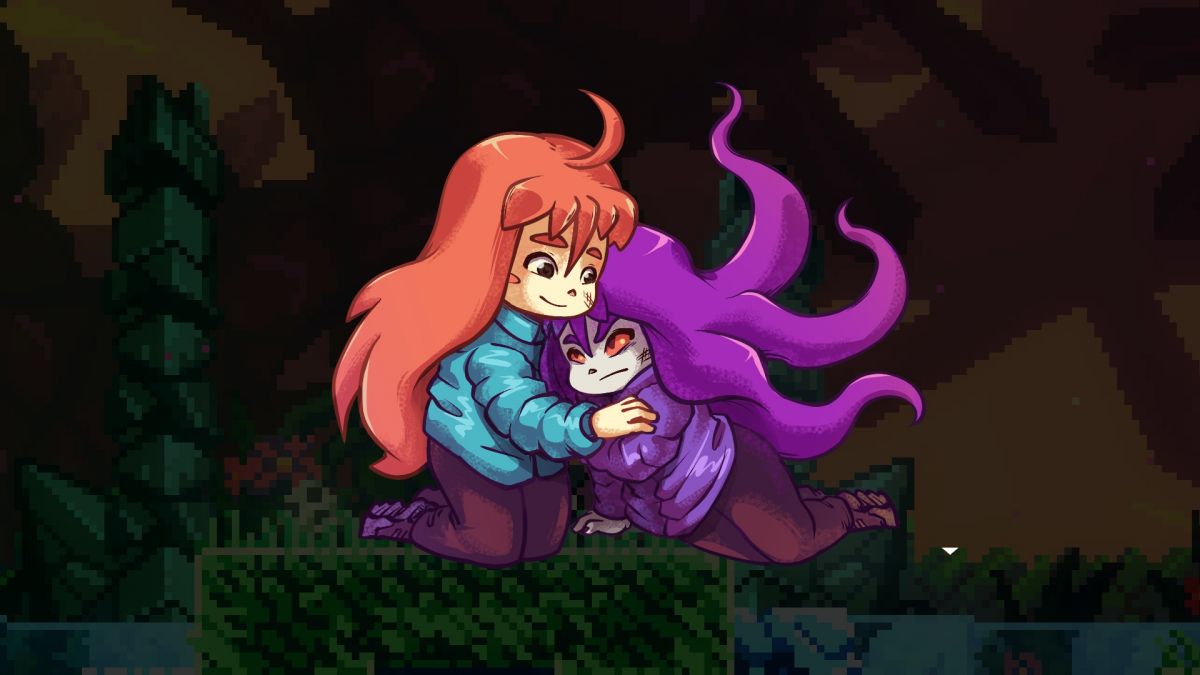
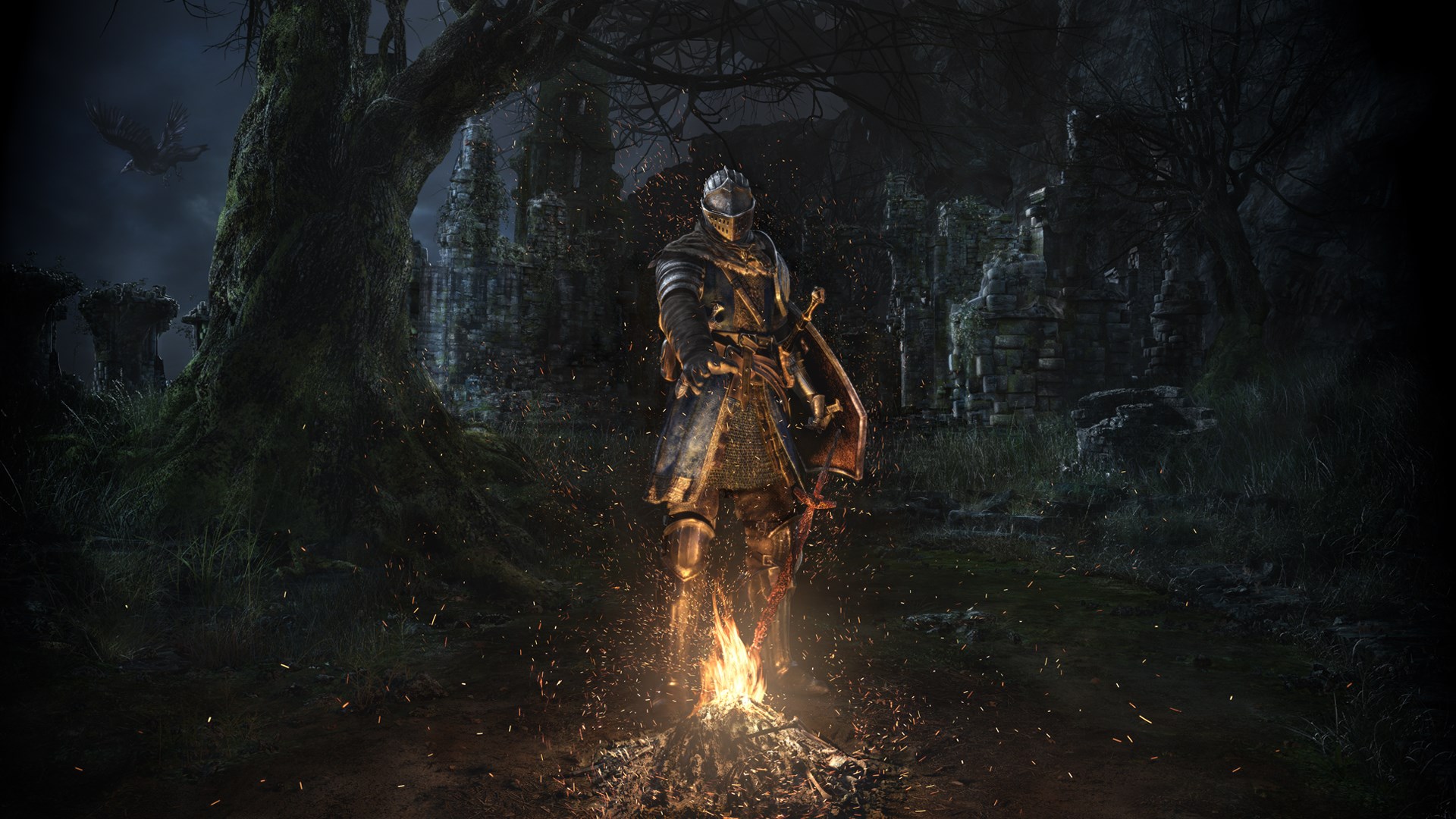
With the game's impending re-release on modern systems, I wanted to draw attention to the ways Dark Souls reflects and represents elements of depression. Please consider this a Content Warning for depression. If you are suffering from depression yourself, I beg of you: Seek professional help. If this is difficult, then please try to reach out to someone; a friend, a stranger. If you cannot do that either, then that's OK; but please don't give up. Try again later.
Remember that depression is often also a biochemical problem. Medication may work, and sometimes it is the only possible solution. I will praise a videogame here, but this is not the cure-all for any kind of mental health problem. My primary aim here is to analyze the game from the viewpoint of a depressed person; it is not to provide comprehensive advice to depressive people.
Spoilers will be marked clearly. Prospective newcomers to the series are warmly invited to read this, as are trusted veterans. Gather around this fire, siblings, and retain your humanity for a brief moment.
------
Depression ruled my life for a number of years. I was fortunate enough to have experiences milder and more tempered than those of many others; but it was still incredibly difficult for me to deal with. In a life where I sometimes felt too empty to leave my bed, it was a blessing to have artistic works so readily available; unfortunately, many works entirely failed to connect with me. Dark Souls was one of the few works that did. I will here attempt to explain why.
To me, depression was an interlocking framework of ideas, habits, and patterns. It may be approximately summarized by the following thoughts:
- "I am not important; this world does not care about me, and my decisions do not matter. I am not worthy of love and care."
- "The world is inherently nonsensical; things happen for no visible reason, and internal consistency may at most be assumed."
- "Everyone else is succeeding; I should be ashamed of myself."
- "My person, as well as my situation, are not mechanical, but esoteric and immensely personalized in nature. My problems are unique and uniquely unknown; without complete understanding, I cannot hope to solve them. Thus, neither I nor my situation will improve, and my efforts will prove futile."
- "Reaching out to others is useless; they cannot understand me, and cannot help me. Moreover, opening up will only invite scorn and shame."
Finally, note that 4 and 5 in particular are key thoughts that impede progress. Thus it is especially important that we deal with these.
------
If it's clear to you why the majority of games fail to speak to someone with depression, you may skip this spoilered section. But maybe it's not. In that case, hopefully this will help you understand:
Before we move on to how Dark Souls tackles these thoughts, let's briefly examine the symmetrical thoughts that are held by many other videogames (some of them excellent in their own right).
If you're now thinking, "That sounds like exactly the type of game depresssed people need to play!", then, well -- you're half right.
A brief detour: Representation takes one of two equally important forms.
The first is to inspire to greatness. Think superheroes, people with agency, etc.
The second is to provide a template (a character, a mood, a statement) to identify with. In general, this will take the form of characters suffering from some sort of problem (such as social awkwardness, a break-up, a disability, oppression -- and, indeed, depression) which people may identify with in order to find validation, catharsis, and, potentially, solutions. It may also take the form of a work's very structure -- which, in games, may for a large part be described by its mechanics -- resembling a kind of attitude or experience.
There will be depressed people for whom the first type of representation works well. In this sense, the games described just now will work wonderfully in helping them turn their thoughts and attitudes around.
But there are also depressed people who need the second type of representation. For them, the positive thoughts promoted by most games have the opposite effect: They will scare them away; make them feel utterly like the game was designed for someone else; like it is speaking to someone else.
I was of the second type. I was rendered unable to connect with the vast majority of games; I felt like they promoted a view of oneself and of the world that was utterly alien to me. A framework that I could not recognize myself in. An experience that I could not share. Thus, even though the individual lessons named above are valuable, I was often withheld from learning them by the extent to which they all come together to form an experience completely unlike depression.
- The world revolves around me; I am the person with the most agency, and my decisions matter both on the small scale (inter-personal relationships) and on the large scale (influencing the fate of the world). I freely impose my will unto others. I have companions. NPC's are kind and grateful. The game itself showers me with rewards. It is constantly engaged with the task of engaging me, primarily through a constant soundtrack, and secondarily through clear tasks and quests, a high-stakes storyline that I play a key role in, etc. The game makes its rules clear to me; it wants me to play.
- Everything that is important in the world is made clear to me. Events are clearly foreshadowed; they occur according to known rules, reasons, and motivations. Internal consistency is always clearly visible. The world is designed to make sense from the perspective of the player.
- You are succeeding.
- Your problems are described in simple terms, and are themselves simple. They are either easily solvable, or solvable through easily understood means (such as practice, strategy, etc). Your problems are mechanical in nature, and may be solved through a series of clear steps. In particular, when you fail, you may clearly see why, and it is clear how to improve.
- You do not need to reach out; the game itself offers you all the tools and knowledge that you need. You need not look online for guidance; need not ask other people for help. You can solve everything on your own; you can beat the game on your own.
If you're now thinking, "That sounds like exactly the type of game depresssed people need to play!", then, well -- you're half right.
A brief detour: Representation takes one of two equally important forms.
The first is to inspire to greatness. Think superheroes, people with agency, etc.
The second is to provide a template (a character, a mood, a statement) to identify with. In general, this will take the form of characters suffering from some sort of problem (such as social awkwardness, a break-up, a disability, oppression -- and, indeed, depression) which people may identify with in order to find validation, catharsis, and, potentially, solutions. It may also take the form of a work's very structure -- which, in games, may for a large part be described by its mechanics -- resembling a kind of attitude or experience.
There will be depressed people for whom the first type of representation works well. In this sense, the games described just now will work wonderfully in helping them turn their thoughts and attitudes around.
But there are also depressed people who need the second type of representation. For them, the positive thoughts promoted by most games have the opposite effect: They will scare them away; make them feel utterly like the game was designed for someone else; like it is speaking to someone else.
I was of the second type. I was rendered unable to connect with the vast majority of games; I felt like they promoted a view of oneself and of the world that was utterly alien to me. A framework that I could not recognize myself in. An experience that I could not share. Thus, even though the individual lessons named above are valuable, I was often withheld from learning them by the extent to which they all come together to form an experience completely unlike depression.
------
When I was suffering from depression, Dark Souls was one of the few games I could connect with. These are the reasons why:
I. The gameplay loop makes the player accept and learn from their failures
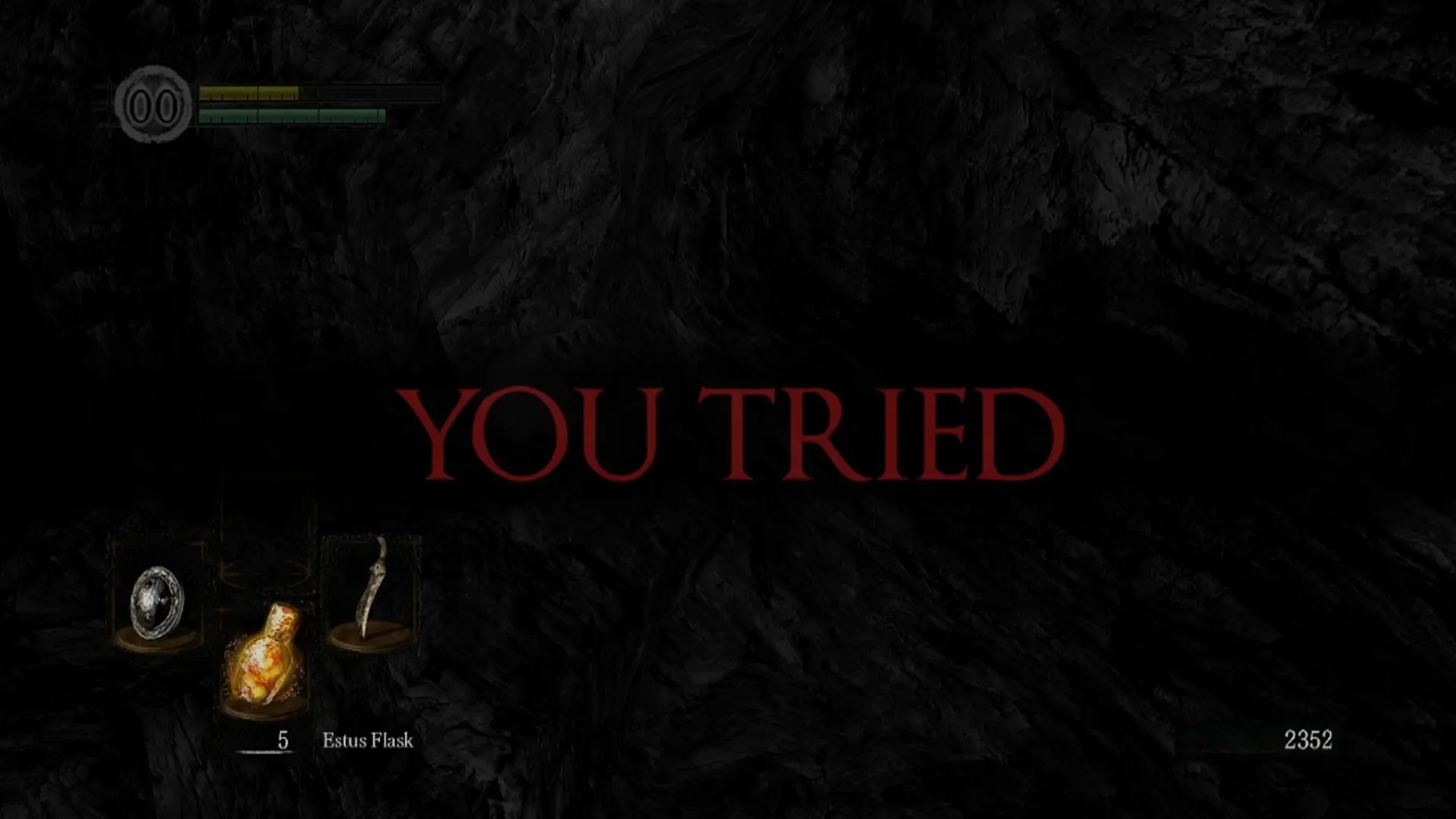
This one will be very obvious to anyone familiar with the series, so let's get it out of the way first.
Dark Souls, more than most games, makes it very clear what you did wrong whenever you make a mistake. This may be chalked up to a number of design decisions, including: Slow, easily parse-able combat; clearly telegraphed movement; the short-term reward of lost souls to encourage engaging with your failures and learning from them; the long-term reward of progress, which may be sustained only if the player learns to accept their deaths. The game does not reward your frustration; it rewards thought and care. In this sense, the game trains you to examine your problems, figure out how to solve them, and solve them.
And you're rewarded! You are rewarded. This whole process clearly deconstructs thought [4]. More subtly, it allows the player to engage with thought [2]: In progressing through the game's world and its obstacles, the player will first overcome these obstacles purely because that's the natural response here; but at some point they might start to realize the mental benefits from this. Putting in the effort to fix your own problems is a form of self-care. Dark Souls encourages this attitude.
I think it's interesting that this is the lesson I see most commonly brought up in discussions about Dark Souls. After all, of all the elements I'll name here, this is the one most common to videogames in general; it is the least characteristic of Dark Souls, specifically. Nevertheless, it is certainly present.
II. The gameplay is mechanically obtuse

Dark Souls does not explain its own mechanics:
- You're told that parrying is an option, but not taught how to do it, nor how important it is to learn.
- You're not told what it means to be hollow.
- You're not told how humanity works, or how it's linked to the online experience and to the strength of various weapons.
- You're barely told how upgrading works.
- You're barely told how stats work, or which ones you should upgrade. (Resistance, anyone?)
- You're barely told how weapon scaling works.
- You're barely told how covenants work.
- You're not told how i-frames work.
- You're not told that you can't hit the ghosts in New Londo Ruins with your weapons. You're not told how to solve this.
- You're not told that basilisks can curse you. (Incidentally, you are told directly how to solve this when you get cursed, which is the only time the game breaks character like this.)
- You're not told that you can kill friendly NPC's. You're not told that they will stay dead. You're not told that you may appease them, nor how.
- You're not told that you can return to the Undead Asylum. The method through which you do this, practically requires that you know what it is for.
- You're not told how to access the DLC, which is a ridiculously convoluted process.
- You're not told that ~between a third and a half of the game's areas and bosses are entirely optional, to the point of being downright hidden.
All of this emphasizes two things:
Firstly, it's clear that the game does not find you important enough to explain these basic concepts to. It feels as though the game doesn't deign to help you. A sense of insignificance is thus fostered. [Thought 1]
Secondly -- and this is a point I will return to often: You cannot understand Dark Souls on your own. It is not meant to be played alone. In many ways the player is encouraged, throughout the game, to connect with other people.
The first time players will do this is when they have questions about the game's mechanics; this is likely to happen within, say, the first four hours. In this sense the game provides a kind of 'training' for later internet scouring: You will find the places where the game's mechanics gathered and summarized, but you will merely read the info. You will become aware of the community, but you are not yet asked to participate. Nonetheless, you are primed to accept that you will need external guidance to deal with your problems. [Thought 5]
This last point symbolizes something quite stunning: Dark Souls knows that it does not exist in a vacuum. What would typically be bad game design -- namely, the fact that the game is very hard to figure out on your own -- is repurposed here as a tool to encourage initial player communication. I'm reminded of Miyamoto's decision, in the first Zelda game, to hide Link's sword [Link] , so as to encourage gamers to help each other. It is no coincidence that Dark Souls, a game so often seen as a modern, mature reinterpretation of Zelda, took this facet into consideration as well.
As a matter of fact, its online systems give Dark Souls a very special relation to the internet. Let's look at these in more detail.
III. Players' ghosts and messages populate the world

To human and 'hollow' players alike, the world of Dark Souls contains a bevy of online elements. These may seem small, but they are very intentional, and provide an important core to the game's message.
Ghosts show up primarily as bloodstains, and occasionally just randomly. They occur most often when you sit down at a bonfire; you will see flashes of other players sitting down with you, to rest from their journeys. You may share short moments of respite with them; you cannot communicate or interact with them, but you may watch them, and take solace in the fact that you are not alone. Countless others, of any identity, are struggling with the same problems that you are trying to overcome, and though you may not always see them, they walk besides you in the metaphorical world of Lordran.
And - what a joke! Countless others are constantly failing! As you play through the game, you will rarely go a minute without getting a chance to see someone die. Their most embarrassing moments are anonymized and then broadcasted to players all over the world. Yours are, too. Thus you are told: Failure is OK. Failure is not merely your own; it is common, it is public, and it is shared. Most of all, it is not something to be embarrassed about, and you are encouraged to laugh about it! [Thought 3]
Messages from other players show up everywhere, to the extent that some people have likened Dark Souls to a holiday tourist trip [Link].
These messages may sometimes troll and mock the player, but more often than not they are supportive and helpful. More importantly, while you may choose not to read them, you cannot diegetically turn them off (except by going offline), meaning that you're always reminded of the presence of the community. If you do read them, you will be trained to accept and even seek out consistent external guidance. Everywhere you walk, there are people willing to help you; the only thing you have to do is swallow your pride and accept their help. [Thought 5]
IV. The Humanity mechanic is a realistic metaphor for opening up to other people

To those who are unaware: In the world of Dark Souls, players may find "humanity" items that they may use to go from undead to human state. While human, you may summon other players to your own world to help you; but you will also be open to getting invaded by malicious players.
People who suffer from depression and who haven't opened up about it yet, generally have two options: Continue suffering in silence, or talk to other people and risk getting shamed for it.
The reason many people tell depressives to talk about it, isn't just because it helps and is an important step towards recovery; it's also because, in general, the majority of people a depressive might choose to open up to, will not shame them for it. Some will even do their best to help. But you can't be sure beforehand. One thing you are sure of: If asking for help fails too often, you will stop reaching out.
Dark Souls' humanity system reflects this reality. You've died often; you're in a bad place now, and may not see a way out of your troubles. You have the option of turning yourself back into a human by using up a humanity item; but your resources are limited, and you're not sure if now is a good time to become human. But you may summon help, and when you do, you might find that your problems are much more easily bested.
The wonderful reality of this system is that people in Dark Souls are much more eager to help than to invade. This might have a number of mechanical explanations -- the respective rewards of helping vs. killing; the respective difficulties of helping vs. killing; the in-universe factions that incorporate aid being more fun than those that encourage invasion -- but the basic truth of it is, that if you want to overcome an obstacle, then asking for help is a decision that is superficially scary, but which in practice will very often work out well.
And then -- lo! You share part of your story with someone else. In a decision made by yourself, in what little agency you have left, you literally let them into your world; and for a short time, they will help you overcome your obstacles; they will show you hidden treasures you would never have found on your own; and sometimes they will give you tools to make your journey easier after they have gone. As it goes in the game, so it goes in real life. [Thought 5]
------
Time to switch gears. Let's talk about atmosphere, narrative design, and story.
V. The atmosphere is daunting and somber
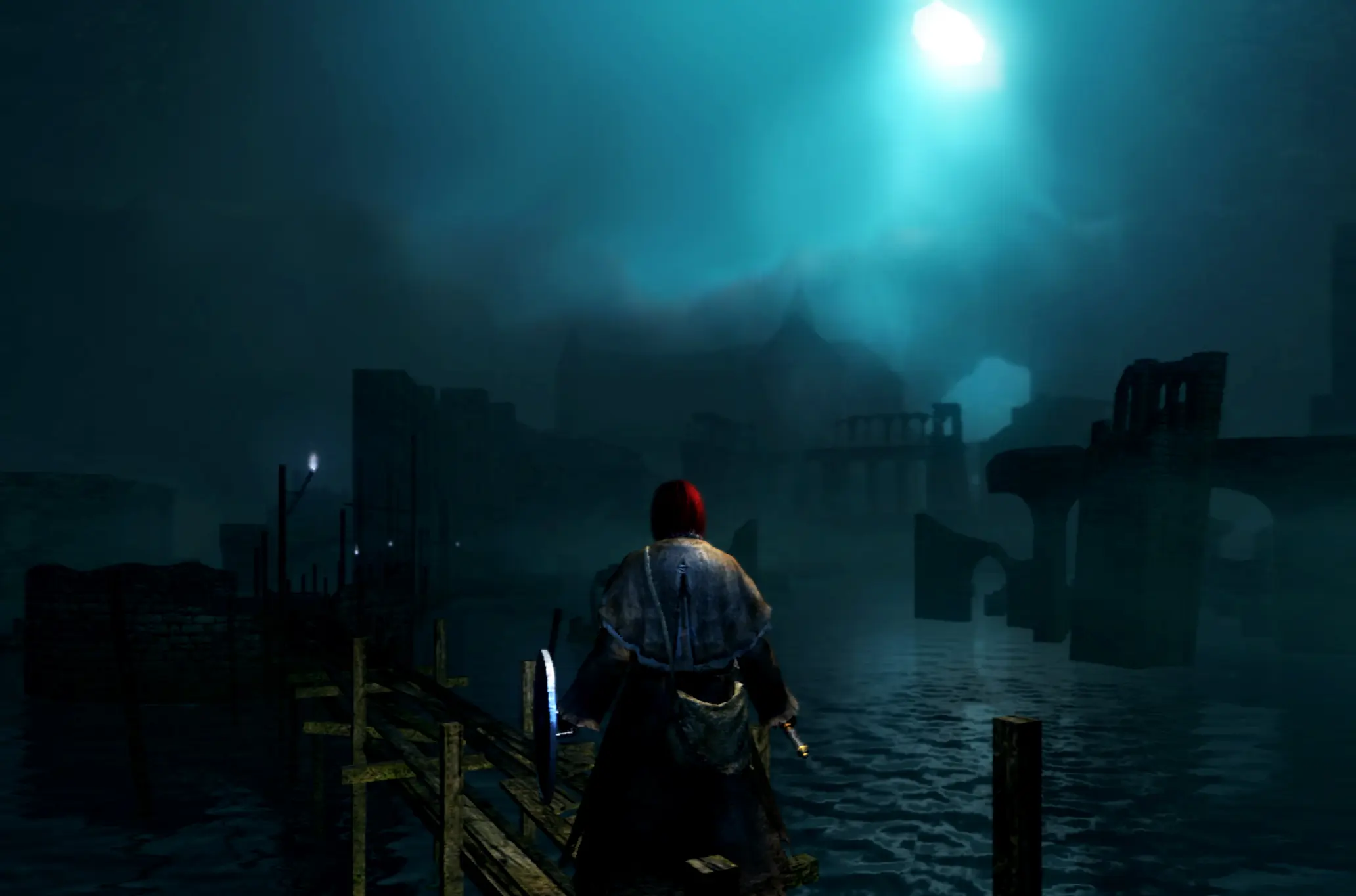
Dark Souls is an excessively somber game.
The world is slowly dying out. Everyone is either powerless or has gone insane. The old gods sit upon their thrones. Your foes strike hard and without mercy. The path ahead is unclear. Your peers talk in riddles. The fire is fading.
The overwhelming feeling one gets from this game is hopelessness. It has one of the bleakest universes I've ever seen. The starting areas are already dour; later areas -- Blighttown, Tomb of Giants -- are downright disheartening.
I think one of the most powerful ways in which Dark Souls communicates this hopelessness is through its use of silence. Many areas - save for the Firelink Shrine, the closest you'll get to a home here - are devoid of any music at all. In a medium where a constant background score is the standard, in Dark Souls it feels like even the game itself has lost hope for its world. What better world to start out with, if you want a depressed person to feel like their experiences are being represented?
VI. The narrative design is obtuse

Veterans, it's time for a reality check: Almost no one who played the game, understood any part of its story [Link].
In other words: Before we talk about Dark Souls' story, we should talk about the way its story is delivered.
Dark Souls tells its narrative not through cutscenes, but through snippets of conversation, through fragments of factoids from item descriptions. People are named once or twice, and thirty hours later you defeat them -- not knowing what they had done; not knowing what they stood for; not knowing who they were. The game has a coherent story, to be certain; but it cares very little about making sure the player understands it. [Thought 1]
Another aspect of its storytelling that I don't see highlighted as often, is the way that the world seems to operate on its own terms, cut loose from the player's influence. Characters move from place to place without your interference; they kill one another, or they go hollow, often not because the player did something, but because they didn't do something. Unlike the vast majority of choice-systems employed by videogames, decisions in Dark Souls are implicit. Situations, relations, and patterns are not made clear to you; if you do not put in the effort yourself to understand them, you will not foresee which events will take place, and thus you will not be there to stop them. Where other games treat the player as someone to be informed at all time -- of possible choices to make, as well as of the consequences of these choices -- in Dark Souls, these elements and their relations to each other are opaque and obscure. The world and its events exist independently from the player, and they move according to their own devices. [Thoughts 1 and 2]
Finally, this kind of story design encourages the player to look up story details; who were these people? What happened here? What stories are locked away in these dark places? Together, the community has created a kind of canon which is still the topic of much discourse. Rather than yielding all details to the player within the confines of their own narrow experiences, Dark Souls encourages players to talk to one another about what they think took place in Lordran, and what kind of people its inhabitants were. [Thought 5]
VII. The story itself brilliantly mirrors the player's insignificance
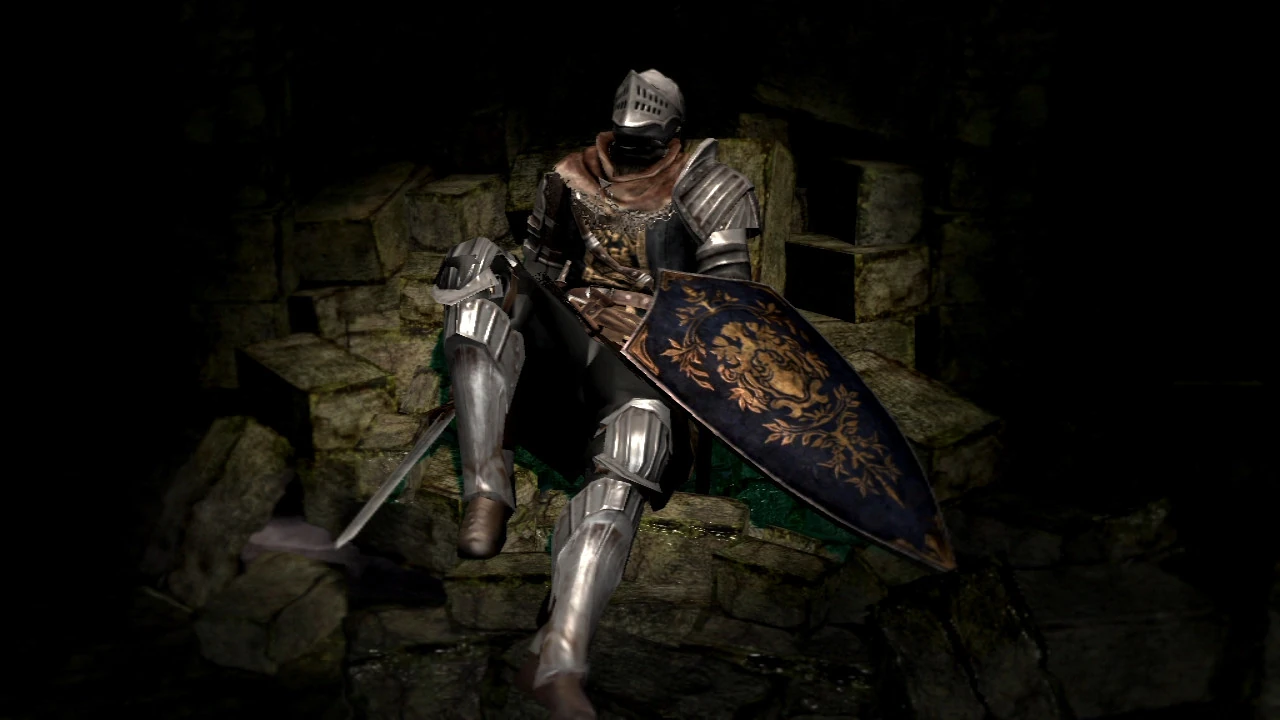
Within the game's story itself, the player is utterly unimportant.
Let's take a second to appreciate this, because it's really unusual. Most games straight-up make the protagonist the big hero of the world who can save the day on their own. In Dark Souls, you start off imprisoned and hopeless; the only reason you may even start out on this harsh journey is because someone else, knight Oscar, decides to give you a helping hand. He tells you about some sort of prophecy that someone will save the world, but the rest of the game sure doesn't make it feel like you would be that hero solely because some fate deemed it so; at most, you make yourself the hero through your efforts to save the world. It's a power fantasy still; but you make the choice for yourself to achieve great things. What better narrative to give to a depressed person?
The player is on a journey, make no mistake; but what this journey entails, or who they are fighting, or what they are fighting for... All of it is vague, and few NPC's care to inform the player about it. Thus the game keeps up its facade of not caring about the player. [Thought 1]
I wish I had the time to talk about Artorias, and how his story represents, deconstructs, and reconstructs the 'Hero's journey'-narrative. I wish I could write about Quelaag; veterans will be aware of just how little the game tells you about her situation, compared to what there is to know. Each of these stories, and many other narratives contained within the game, hammer home the point that the player is insignificant; that they know nothing; that this world cares about none of its people.
I will share only one such story (which contains spoilers to anyone who hasn't delved deeply into the lore) to illustrate the incredible extent to which Dark Souls' world is willing to hide its own machinations from the player's eye, as well as the amount of agency it is willing to rob from the player, unbeknownst to them. [Thought 2]
You are being misled.
The prophecy is fake; you are no hero; your goal and your actions were wholly designed by people with motivations entirely their own. All throughout the game you are being guided -- subtly, imperceptibly -- by Dark Sun Gwyndolin, a character you will normally never even meet, towards extending the Age of Fire. The faction who is against them (led by Kaathe) is made to work from the shadows; and whereas Dark Sun Gwyndolin at least sends spokespeople who operate under the guise of helping the player, you are unlikely to so much as meet anyone from Kaathe's faction across a 70-hour playthrough.
It's a Bioshock-level twist, one that could carry two entire games on its own; yet here it is kept hidden, to the point that I've only ever seen about five people - at most! - take note of it.
A succint and lovely explanation of this sub-narrative -- as well as a passionate and well-written argument that the game misgenders Dark Sun Gwyndolin; a definite flaw in the game's story -- may be found here: [Link].
I hope you will find it as eye-opening as I have; here is a game that questions so many of the default assumptions that we make when we play videogames, and which furthermore is bold enough to hide this from all but the most perceptive players. It shows an astounding respect for the player's intelligence, of a type and at a level that I've previously only ever seen in Nabokov's Lolita.
The prophecy is fake; you are no hero; your goal and your actions were wholly designed by people with motivations entirely their own. All throughout the game you are being guided -- subtly, imperceptibly -- by Dark Sun Gwyndolin, a character you will normally never even meet, towards extending the Age of Fire. The faction who is against them (led by Kaathe) is made to work from the shadows; and whereas Dark Sun Gwyndolin at least sends spokespeople who operate under the guise of helping the player, you are unlikely to so much as meet anyone from Kaathe's faction across a 70-hour playthrough.
It's a Bioshock-level twist, one that could carry two entire games on its own; yet here it is kept hidden, to the point that I've only ever seen about five people - at most! - take note of it.
A succint and lovely explanation of this sub-narrative -- as well as a passionate and well-written argument that the game misgenders Dark Sun Gwyndolin; a definite flaw in the game's story -- may be found here: [Link].
I hope you will find it as eye-opening as I have; here is a game that questions so many of the default assumptions that we make when we play videogames, and which furthermore is bold enough to hide this from all but the most perceptive players. It shows an astounding respect for the player's intelligence, of a type and at a level that I've previously only ever seen in Nabokov's Lolita.
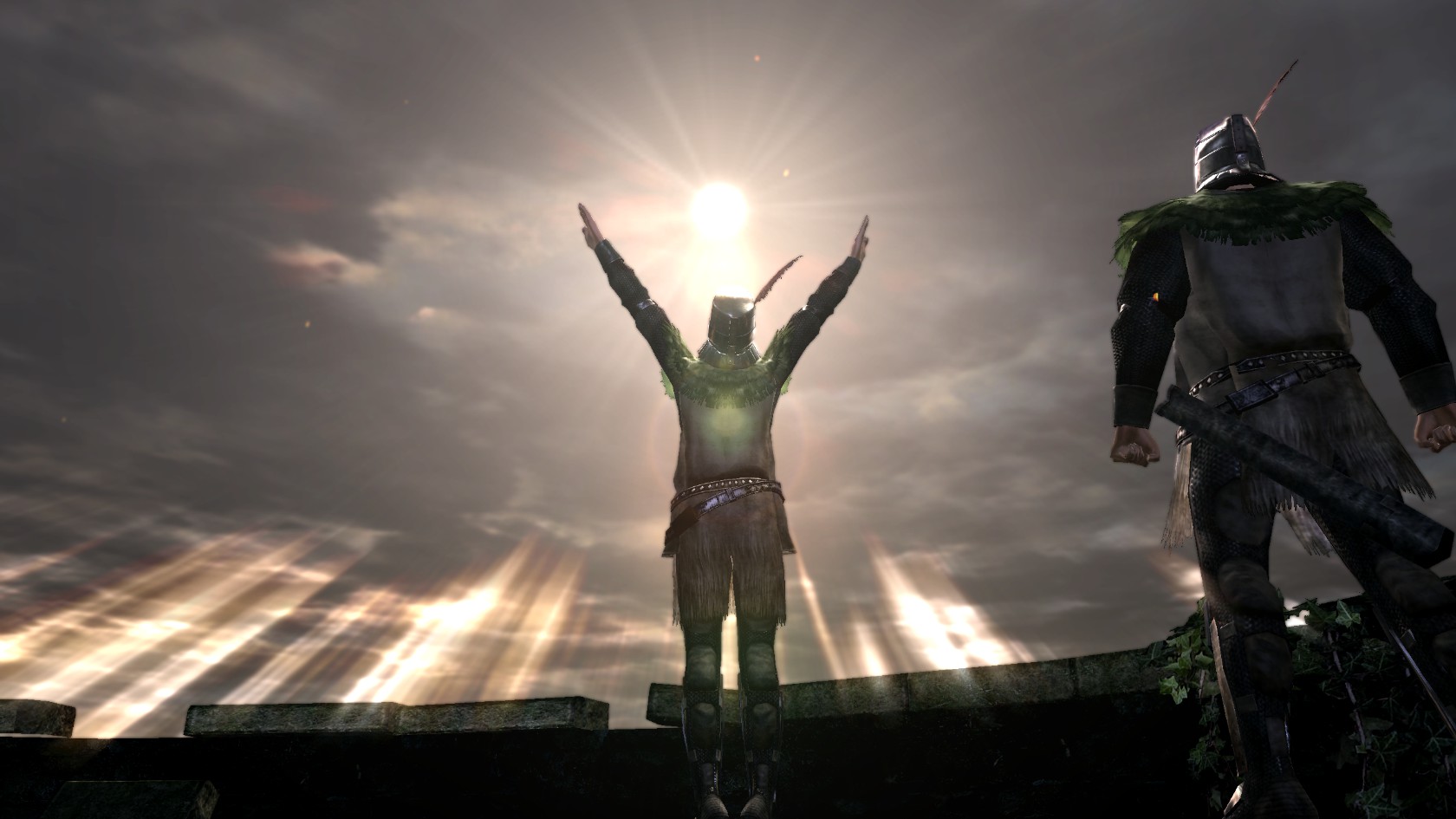
What was this all about? If we take the above into consideration, how do we end up with the view that Dark Souls provides depressive people with a valuable representation of their lived experiences?
I argue as follows: The game validates depressive people in thoughts 1 and 2, so as to gain a platform for communication with them, which it then uses to thoroughly deconstruct thoughts 3, 4, and 5. The things that it teaches against thoughts 3-5, are all concerned with connecting with people. You are not alone; you should not feel ashamed; other people can help you; other people understand your problems; your problems are common, and have been solved by others, so you may solve them as well.
As may be expected from such a game, I have found its community to be very supportive of new and old players alike. But there is another quality to these people, one which I don't often come across on the internet: It is their openness. It is their willingness to talk honestly about their own experiences. Guided by the game towards the community, and goaded by the game to open up about their problems within the game, as well as to find the strength to fight their own problems, they have learned, from these experiences, the courage to talk about themselves and their own lives with other people. By and large, the responses are often fantastic:
- Read here from someone who was led to the community through the game's obtuse mechanics, and came to love both the game and its fans.
- Here, someone else who found in Dark Souls a metaphor for depression.
- Listen to NakeyJakey here, who found strength in the game's messages.
- Read here from someone who found kindness in the game's difficulty.
- Here, a whole bevy of people who found in Dark Souls the strength to overcome their own depression.
- Here, someone who found in it the strength to fight through cancer.
------
Dark Souls often seems like a hard, scary, and unloving game. Everyone here will know of its reputation as such. And on the surface, this is absolutely correct; these are the qualities that Dark Souls intends to communicate, because only in this way may it speak to those who most need to hear its words.
As a matter of fact, all of its macho posturing as a tough, hardcore, PREPARE TO DIE videogame -- all of it may be taken as one great facade designed for the depressive people for whom only the identification-type of representation works [Link].
In truth, Dark Souls is a game that loves its players -- even when they cannot love themselves.
------
Enjoy the remaster, everyone! And remember, if you're ever in a tough place and need some advice:
git gud --- and don't be afraid to ask for help!
Last edited:


